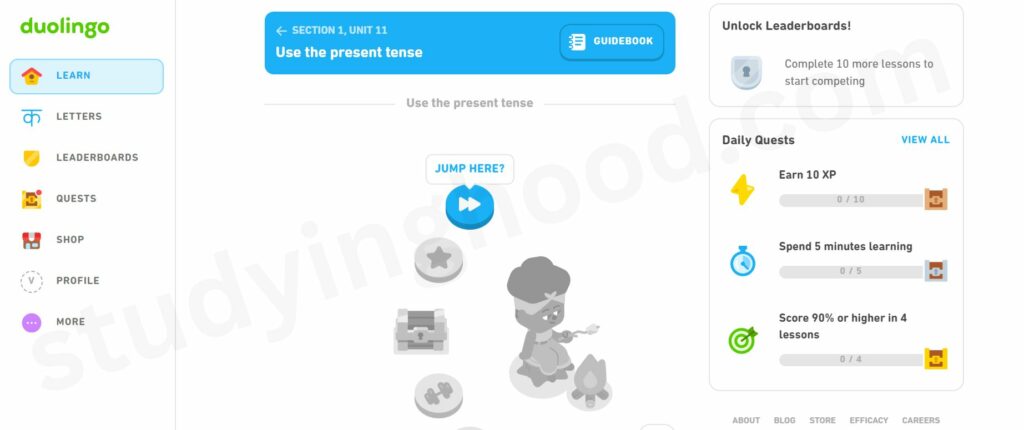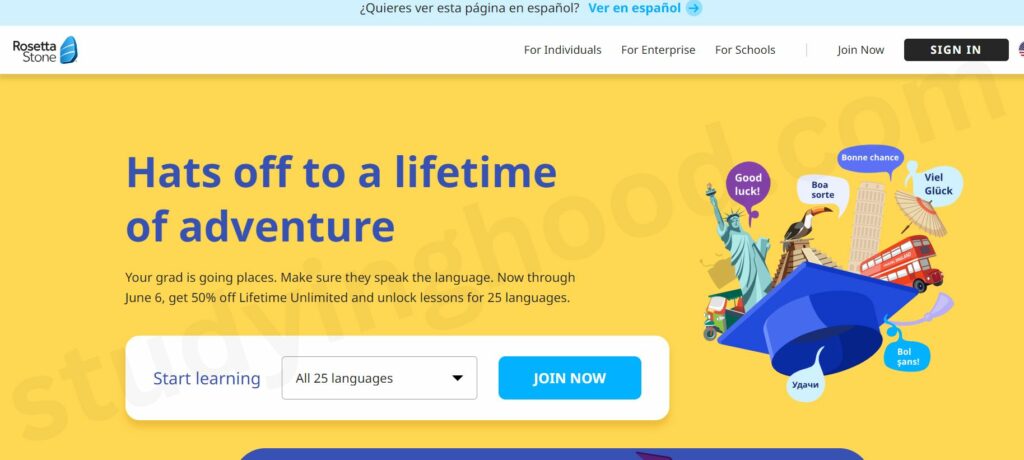Duolingo vs Rosetta Stone: Which one to choose in 2024
Learning a new language is a never-ending process. Every time I start learning a new language, I am surrounded by multiple platform suggestions. It always made me confused, so I started researching on my own. Two platforms worked well. First, of course, was Duolingo, and second was Rosetta Stone. Are you also stuck between these two platforms? If yes, go with this guide to understand the comparison between Duolingo and Rosetta Stone.

Duolingo vs Rosetta Stone: Differences
To know which is a perfect platform, it is important to know what platforms are. Further, I have discussed some features showing how both the platforms are different-
1. Number of Languages
Before choosing a platform, I always check how many languages I will get on it. Rosetta Stone offers 24 languages, whereas Duolingo offers 41 languages for English Speakers. Following are the common languages on both of the platforms are-
- Arabic
- Dutch
- Chinese
- English
- French
- Greek
- Hebrew
- Polish
- Italian
- Japanese
- Hindi
- Irish
- KoreanGggbbRussian
- Spanish
- Turkish
- Vietnamese
- Swedish

2. Pricing
When you go out in the market, what is the first thing you look at? The budget. The same is the case for choosing the right platform. You must know the price of it. If you are on a tight budget, choose Duolingo. Why? Because it is free to use. I have been using Duolingo since 2019. Trust me there is no better free platform than it. However, every free platform comes with a price. It means, Duolingo also has it. The price you pay on Duolingo is in the form of a subscription plan. If you take the subscription, you become a super member.
There are two different types of plans: Individual and Family plans. Your price will depend on the chosen type and the plan’s duration. But the question is whether the subscription plan is worth it or not. Trust me, I would never take a subscription plan on Duolingo. It is because the subscription plan does not add much to your learning goal. Try to save money for other apps.
On the other hand, Rosetta Stone is a paid app. Although it offers a free trial, there is no proper free version of it. You only get a free trial for three days. The following table shows how much you will pay for a subscription plan-
| Rosetta Stone | Duolingo |
| 3-Months plan – $47.97 ($15.99/month) | Individual Annual Plan – $83.88 ($6.99/month) |
| Annual plan – $167.88 ($13.99/month) | Family Annual Plan – $119.88 ($9.99/month) |
| Lifetime Plan – $399 one-time payment |
3. Type of users to focus on

What kind of person should use a particular platform is also important to know. In my case, I always prefer using Duolingo for a new language. It means as a complete beginner, you must choose Duolingo. As it is totally free to use, it can be a perfect choice. Also, Duolingo itself states that the course is designed for beginners to intermediate learners. Try to complete the Duolingo course first.
On the other hand, if you know the basics of the language, choose Rosetta stone. The lessons on this platform were based on everyday conversations. So, I can say it is a perfect choice for the travelers. However, if you are tight on the budget, do not use it. Also, you will enjoy it if you are a visual learner.
4. Voice recognition quality
Both of them have it, but the quality is way more different. Starting with my favorite one- Duolingo. I love the way Duolingo makes me learn the language. But does it mean that everything is great about it? No. The voice recognition tool is a big drawback to Duolingo. I will not say that it works poorly, but definitely, not up to the mark. This gap is completed by Rosetta Stone. Whenever I want to practice my pronunciation skills, I go for Rosetta Stone. The voice recognition of this platform is just amazing. It has its own tool known as TruAccent Voice Recognition technology.
5. Live classes
Are you someone looking for online classes? If yes, stop thinking of Duolingo and choose Rosetta Stone. Rosetta Stone is an amazing platform when it comes to teaching. The teachers are so helpful. They take to create the course curriculum, keeping your level of mind. However, to get access to it, you must be an active subscription user. The cases are 25 minutes long and are generally one-on-one classes.
Note: Earlier, it was not included in the subscription plan. You have to pay for it.

Here is a quick analysis of the Differences I have discussed on-
| Features | Duolingo | Rosetta Stone |
| Number of Languages | 40 | 25 |
| Pricing | Individual Annual Plan – $83.88 ($6.99/month) | 3-Months plan – $47.97 ($15.99/month) |
| Type of Users | Absolute Beginners | If you know some basics |
| Live Classes | No | Yes |
| Voice Recognition Tool | The quality is not that good | Perfect for you, if you want to practice your conversational skills. |
How are the courses designed on both platforms?
The main thing that decides whether to take the course or not, is how it is designed. Further, I have discussed how the course is designed on both the platform-
1. Duolingo
Duolingo is a well-known platform for its gamified approach. In the past few years, Duolingo has changed its course structure a lot. When I started using it, there was a tree system. But at present, you get a new learning path. In this path, the courses are divided into different sections, which are further divided into units. These units are further split into a set of lessons. The process may seem boring to you. But trust me it is not. In each lesson, there are several engaging exercises.

Honestly, I love all of them. Be it matching the pair or the listening exercise, everything is superb. At the end of each unit, you get a legendary level. It is the level that helps advance your knowledge by taking a practice test. The design of the exercises is so amazing. Another interesting thing you can take in a course is Duolingo timed challenges. As the name suggests, it is the one that moves around time. I really think it is a great way to test your knowledge.
2. Rosetta Stone
Rosetta Stone is a platform that follows a particular course structure. It follows the immersive technique of learning the language. The lessons are created in the form of a module. Each module is 30 minutes long. However, what I liked about the platform was, that I could break the lesson into 3 mini sessions of 10 minutes each. After that, there were 3 – 15 supplemental drills. These drills were nothing but just daily exercises. Of course, it was something that improved my knowledge a lot.
Each exercise is of 5-10 minutes in length covering different aspects like pronunciation, grammar, writing, and listening exercises. If you are a visual learner, you will easily understand the lessons. During my lessons, I mostly find myself, listening to the words and matching them with the visuals.
Duolingo vs Rosetta Stone: True Opinion
According to me, both platforms work commendably. It depends upon your own necessities. Duolingo is so popular because it is a free platform. You are getting to learn something that is too free. So, if you are on a tight budget, surely it’s the best platform for you. But if you have no budget, choose Rosetta Stone.
However, remember, Duolingo courses are created for absolute beginners. It means that you can not get an advanced level. Thus, if you are already at the advanced level, choose Rosetta Stone. I know without knowing the benefits and drawbacks, it is impossible to decide which platform to choose. Thus, I have discussed them for both platforms.
Benefits and Drawbacks of Duolingo

Duolingo is the most popular platform in the language-learning world. I always wondered why it is so. But after using it, I can surely give you the answer. Here is a table representing the Advantages and Drawbacks of using Duolingo-
| Benefits | Drawbacks |
| Totally free to use. | Do not have any advanced level knowledge. |
| Good for beginners. | Less grammatical explanations. |
| Lots of Engaging activities. | There is a heart system, in which you only get 5 chances to make a mistake while practicing. |
| Follows the spaced repetition system for the words you are making mistakes in. | The voice recognition tool does not give correct answers. |
| The lessons are short. It hardly takes 15 minutes to complete them. | |
| You get reminders to complete your lessons. |
Benefits and Drawbacks of Rosetta Stone
Have you ever gone to a market and bought a product knowing its pros and cons? Most of the time, the answer will be No. It is because you want to value your money. The same should be done while buying an online subscription plan. Thus, below I have given a table showing the advantages and drawbacks of Rosetta Stone-
| Benefits | Drawbacks |
| The course structure is proper. | It is a paid platform. |
| There are live teaching classes available. | Unlike most paid platforms, there is no certificate for completion. |
| If you are a false beginner, it is a perfect choice for you. | There are no reminders to complete the lessons. |
| The voice recognition tool is also very nice. |
From the two tables mentioned above, surely, it will be easy for you to understand which platform to choose.
Conclusion
Duolingo and Rosetta Stone are both amazing platforms through which you can learn a language on your own. One is paid, and the other is free. Duolingo offers its services for free, whereas Rosetta Stone does not. Additionally, Duolingo offers courses for beginners but lacks advanced-level content. On the other hand, Rosetta Stone offers courses for both beginners and advanced learners. It also provides live sessions, a feature not available on Duolingo. Thus, I would say both platforms are good in their own ways. I suggest choosing Duolingo if you are a beginner: learn the basics for free, and then move on to Rosetta Stone.
FAQs
Is Rosetta Stone free?
No, you have to take the subscription plan. However, you get a three-day free trial period.


